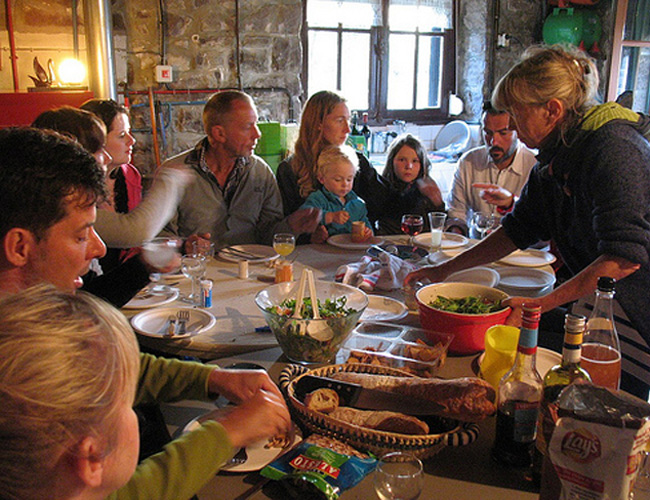 フランス人の友人の家族が勢ぞろい。ジャッキーはフランス語を話すことができたのだろうか? JACKIE HOFFART PHOTO フランス人の友人に誘われ、フランス北西部のブルターニュ地方を訪れたジャッキー。苦手なフランス語を話すという挑戦をするには絶好のチャンスだと考えたのですが・・・。
Canada has two official languages, English and French, but most people aren't bilingual. If you are from Quebec, you probably speak Quebec French and English, but if you are from any other province, you probably speak English and very little, if any, French.
Most Anglophone Canadians study French at school, but eventually drop it to specialize in other subjects. I am one of those people. I hated French, mostly because I felt embarrassed to speak it. I understood the grammar and did OK on tests, but I was so afraid to open my mouth and let out those unfamiliar sounds.
When a French friend of mine invited me and some friends to go camping and celebrate a big birthday with her family in Brittany, a region of northwest France, I thought it would be a fantastic opportunity to see if I could speak any of the French I tried so hard not to speak as a teenager. I thought, "I'm not as shy as I was then, let's give it a try!"
Things started off promisingly. My friend had arranged a taxi to pick me up from the airport and take me to the campground (sounds fancy, but trust me, there was no other way).
Shortly after the driver and I exchanged our bonjours, I was completely lost for words. We made our way to the cab with only gestures and nods. It was going to be a long ride and I was determined to really try to communicate with him, so I broke out my best French and said, "Sorry that I don't speak French very well, even though I am Canadian." But I'm sure it sounded something like, "I am Canada, excuse me, bad French."
For the next 30 minutes, between my rusty French and his passable English, we were able to exchange quite a bit of information. He told me about local foods I should try (galette), and I learned about the local crops (corn) and businesses (a huge abattoir) as we drove through the little towns dotting the coast. I learned that although mussels are very popular in the area, they didn't originate locally, but were introduced at some time in the past. I was warned about the green algae on certain beaches. I even learned that he used to drive a lorry in England, mostly delivering chickens to wholesalers. When he dropped me at my destination, I felt I'd done surprisingly well for being so out of practice.
However, with the exception of the occasional merci and bonjour in shops and around the campsite, I spent the next four days speaking English. Why didn't I think about this when I set myself this challenge? I was going camping with English people in France; I should have known I would be speaking English.
I did get one final chance on my last night — it was the big birthday celebration of my French friend. Dozens of people from her family and extended family gathered at the local town hall for the party. I thought surely this would be my chance.
I tried to speak to some members of my friend's family, but I think they were a bit shy around the people from the "England group," much as we were slightly intimidated by the people from France.
Ultimately, the only people I spoke to that night were the French people who spoke pretty good English and started conversations with me — and we spoke mostly in English.
I feel like I totally failed this challenge. Part of the problem was that I just wasn't genki enough — I needed to try harder.
I think I made some bad assumptions, too. Approaching people in large groups is difficult, but it's also unrealistic to just weave myself into any social situation and expect that people will have the patience (and desire) to help me practice my French — especially if they can speak English.
It's a tough one, I'm not sure how to rectify the situation with my French in the future. If I ever move to Quebec, maybe I will take conversation classes...
Next time: What if I ... eat proper breakfasts?
|




